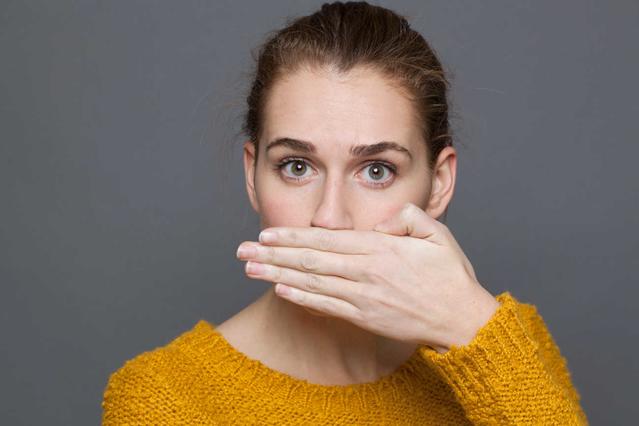Types of Bad Breath
Bad breath, also known as oral malodor or halitosis, is a very common problem. While it is unclear how many people actually experience regular bad breath, some research cites that approximately 50% of the adult population has had occasional or persistent bad breath.
-
01
Morning Breath
Most people find that their breath is not fresh when they first wake up, and unfortunately this is normal. Your natural saliva flushes bacteria and leftover food particles from your mouth and saliva production in your mouth decreases while you sleep. Without saliva to flush them away, the bacteria multiplies breaking down food debris, creating an unpleasant odor. Due to the mouth being a bit drier than normal overnight, a little morning breath is hard to avoid.
-
02
Food Smells on Your Breath
Some foods are notorious for causing bad breath, but maybe not in the way you expect. You may think that particularly spicy or flavorful foods only cause residual odor because food particles remain in your mouth. While this is a common cause of bad breath, other factors may be at work. Once consumed, components from certain foods like onions, garlic, some vegetables, and spices, enter into your bloodstream and are carried to the lungs affecting your breath as you breathe in and out. For example, as you eat garlic is also absorbed into your bloodstream, enabling a secondary wave of odor to make its way into your lungs, where it can freely escape through the mouth. Once absorbed, garlic then emits a bitter scent from your pores.
-
03
Smoker’s Breath
Whether through smoking, chewing, dipping, or a pipe—all tobacco products cause an unpleasant odor in the mouth. Smoking also affects the moisture levels in the mouth and leaves a stale film on teeth and gums. Smokers are also at a higher risk for gum disease.
Is it Chronic Bad Breath?
Chronic bad breath is a condition where a foul odor emanates from the mouth regardless of brushing, flossing, or rinsing. Common “morning breath” most people wake up with is not chronic bad breath and neither is the bad breath that you might experience after eating spicy food.

General bad breath is very common with approximately half of the adult population reporting occasional or persistent bad breath. About half of these people described their bad breath as a severe or chronic problem. If you are concerned about chronic bad breath, your first step should be a re-evaluation of your basic brushing and rinsing technique since most cases of bad breath originate from hygiene conditions in the mouth. In addition to cleaning your teeth, you should give extra attention to cleaning your tongue—this is where a large amount of the bacteria lives that could be causing your bad breath. Scrape the tongue, then brush, floss, and rinse. Remember that brushing alone cleans only 25% of your mouth. Rinsing with mouthwash will allow you to clean virtually your entire mouth.
If you’re concerned about chronic bad breath, you should visit your dentist or hygienist. True halitosis can causes considerable social anxiety and often goes untreated because people are often embarrassed to mention it to their dentist. Don’t be afraid or embarrassed to talk to a licensed dental professional about your concerns regarding halitosis. He or she will most likely be able to diagnose and treat the cause of your breath issues.
Is Bad Breath Normal?
Bad breath is a very common condition. When asked, nearly 50% of adults claimed to have occasional or persistent bad breath, with about half of those people regarding their issue as chronic or severe. After overcoming any anxiety or embarrassment about the problem however, bad breath is quite treatable.




